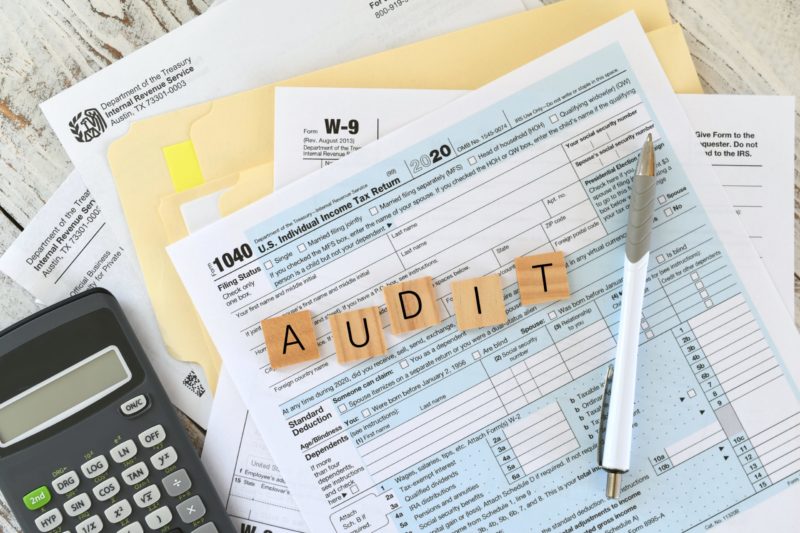The April 18 deadline for your 2023 taxes is quickly approaching. Therefore, one core aspect of annual taxes at the back of every taxpayer’s mind is the possibility of triggering an audit.
Generally speaking, audits are fairly rare, with less than 1% of Americans being audited on a yearly basis. However, this percentage can certainly increase based on certain factors. For example, if you have had a particularly lucrative or unprofitable year, own a business, or have substantial wealth, your risk of being audited naturally increases.
Your best move to protect yourself and your finances is to partner with a tax preparation and planning expert to prevent an IRS audit before it occurs. However, even if your financial situation raises red flags and results in an audit, it doesn’t necessarily signal a catastrophe or a long, difficult road ahead.
What is a Tax Audit?
The Internal Revenue Service (IRS) defines an audit as a review/examination of an organization’s or individual’s accounts and financial information. This review ensures that the information is reported correctly according to U.S. tax laws and to verify the reported amount of tax is correct.
Taxpayers are notified that they are selected for an audit by mail or in-person visit. Additionally, this starts a process where the taxpayer may have to provide various written or electronic records. For example, receipts, bills, canceled checks, legal papers, loan agreements, and more. (A full list of documents the IRS may request is available online.)
What are Some Reasons the IRS Might Audit Your Tax Return?
The statute of limitations for an IRS audit is generally three years, and the IRS uses software to compare similar returns and look for discrepancies. Therefore, it can identify returns that don’t follow the typical mold for comparable financial situations.
A handful of the red flags that might trigger an audit include the following:
- Excessive credits and donations: This includes larger than normal donations to charities, or excessive credits like a home office or vehicle credits.
- Missing income: Failure to report income from all sources, (such as Form 1099-NEC for freelance or contract work or Form 1099-B for earnings on investments), can definitely trigger an IRS audit, regardless of the amount.
- Odd numbers: Credits and deductions with round numbers can seem suspicious, like spending exactly $5,000 on advertising, or spending exactly $10,000 on legal expenses. This is a sign that the taxpayer uses estimations, not the exact figure.
- Refundable credits: Certain credits, like the earned income tax credit a refundable credit for low to moderate-income workers with children, are more likely to raise issues, simply because they can be used with zero taxes due.
What Should You Do if You Get Audited by the IRS?
If you are audited, there are a few preliminary steps you can take to minimize the time, money, and resources spent in the process ahead. This includes the following:
Gather All Appropriate Documents and Paperwork
- The IRS may only ask about specific portions of your tax return, but it’s helpful to have all documentation ready, just in case.
Keep an Eye on the Deadlines
- Generally, you will have 30 days to respond to an audit notice, and the sooner you can respond, the better. Remember that any delays may result in extra interest that is eventually owed to the IRS.
Contact a Professional in Tax Planning Services
- Audits can be complicated and messy, and an experienced tax professional can make the process easier by providing guidance and expertise on the road ahead. This can also help minimize any financial or legal damage.
Proper Financial Planning is the Best Way to Avoid a Tax Audit
Even if your tax returns are simple and in perfect order, the IRS still conducts random audits every year. This means that your risk of an audit is never zero.
As a result, the best way to ensure peace of mind during the 2023 tax season and all tax seasons to come is to partner with an established partner in tax preparation & planning.
Tax Planning and Preparation with Saddock Financial Partners
At Saddock Financial Partners, we diligently work to understand your financial situation, and identify those flags that may catch the IRS’ attention. Our core strength is understanding the ever-changing tax laws and helping businesses and individuals retain maximum capital. Additionally, we’ll navigate tax planning services throughout the year to ensure your wealth and income are continually secure.
Reach out to us today, before April 18, for a complimentary consultation on this year’s big changes to the tax code, and how you may be impacted.
With Saddock Financial Partners at your side, you can maintain your focus on the things that matter and keep the stress of a potential IRS audit off your radar.




